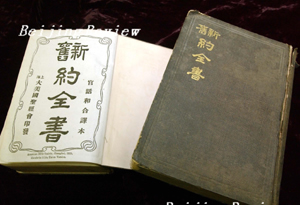
A Western scholar once said that if all English writings were destroyed except the Bible, it would still be a perfect showcase for the beauty and power of the English language. To this, a Chinese may add: Jesus "speaks" Chinese in the same charming manner, as the Chinese Bible also reproduces the beauty and power of the original version.
According to statistics, more than 1,600 versions of the Bible have come out to date. In China alone, its circulation has reached over 300 million.
The ongoing Bible Ministry Exhibition of the Church in China in U.S. cities shows how the Bible has been published, printed and circulated in China with pictures, actual objects, models and multimedia shows.
The exhibition conveys a message to the public: China is home to many Bible readers. In fact, even for non-Christians in China, the Bible holds a key to the spiritual world of the West and is a window on the faith and code of conduct of Western society along with Greek mythology. Its thought-provoking stories, mythical, religious, historical or moral ones, as well as philosophical proverbs have influenced or are influencing the Chinese in varying degrees.
The Bible was first translated into Chinese as early as the seventh century when the prevailing religion in China was Buddhism.
Christianity did not gain a foothold in China until the Opium War in 1840 and was therefore associated with the disasters of the Chinese people. Before that, as a result of its failure to integrate into Chinese culture and society, the religion had disappeared in China several times. When Western missionaries poured into China on imperialist warships, the intense conflicts between them and the Chinese people led to resistance to the faith. In sharp contrast to its vows to spread the gospel and promote the concept of "loving thy neighbor as thyself," Christianity was unfortunately degraded into a tool of the aggressors despised by the Chinese people. There were only about 700,000 Christians across China in 1949. You can imagine how the Bible was received at that time.
A severe "cultural shock" tends to hit Chinese readers when they first open the Bible. Take John 2:4 for example. Most Chinese readers will find what Jesus said to his mother Mary at the wedding in Cana--"Dear woman, why do you involve me?"--unacceptable. (At that time using the word "woman" was the most respectful way to refer to a woman). Chinese readers will have to struggle to understand how Jesus could call his mother "woman" and say something as ruthless as that. In their eyes, Jesus was being offensive to an elder, a serious offense that is intolerable by Chinese moral standards. However, Christians will take the story for granted, as it is their belief that God is above everything and transcends all human relations. Moreover, nobody can interfere in His work.
Nevertheless, the Chinese culture boasts remarkable tolerance and adaptability, as illustrated by its gradual incorporation of Buddhism as an integral part. As a matter of fact, the voice of Christians has never been silenced throughout history, except in certain dynasties and during the Cultural Revolution (1966-76) when Christianity was suppressed.
At present, the number of Chinese Protestants has exceeded 16 million, 70 percent of whom are in rural areas. From 1980 to 2005, some 40 million copies of the Chinese Bible rolled off the presses. Cao Shengjie, President of the Chinese Christian Council, commented that they are not only large in number but also have many varieties, perfectly meeting the needs of Chinese believers. | 